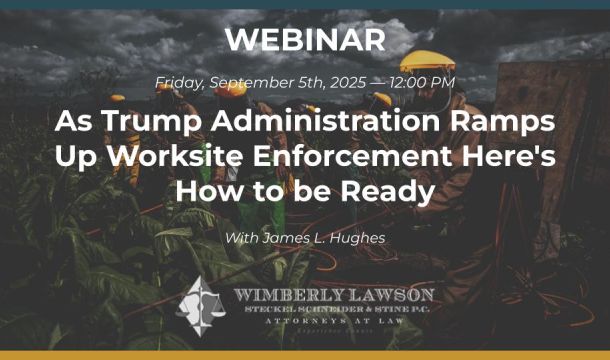Supreme Court Invalidates Major Portions Of Arizona State Immigration Laws
Many states have now passed their own version of immigration laws related to the large number of aliens who do not have a lawful right to be in this country. Arizona has been one of the leaders in promulgating such laws, and four of the provisions of Arizona immigration laws are addressed in a June ruling of the US Supreme Court. Arizona v. U.S., ___ U.S. _____ (June 25, 2012). The question was whether the federal immigration laws preempt and render invalid these provisions of Arizona law. The federal government sued Arizona contending that its State laws intruded on the federal constitutional power to “establish a uniform Rule of Naturalization” and on the federal government’s inherent sovereign power to control and conduct foreign relations.
The Court started with the premise that the Constitution gives Congress the power to preempt State law. Federal statutes may contain an express preemption provision. In addition, States are precluded from regulating conduct in a field that Congress has determined must be regulated by its exclusive governance, and State laws are preempted when they conflict with federal law.
Adopting a broad interpretation of federal preemption principles, the Court concluded that 3 of the 4 provisions are preempted. The first provision made failure to comply with federal alien-registration requirements a criminal misdemeanor. The Court determined that this law gives Arizona the power to bring criminal charges against individuals for violating a federal law, even in circumstances where federal officials determine that prosecution would frustrate federal policies, and is thus preempted.
The second provision made it a criminal misdemeanor for an unauthorized alien to seek or engage in work in Arizona. The Court found that relevant federal provisions do not impose federal criminal sanctions on the employee (i.e., penalties on aliens who seek or engage in unauthorized work), and impose some civil penalties instead. It concluded that Congress decided it would be inappropriate to impose criminal penalties on aliens who seek or engage in unauthorized employment and it therefore follows that an Arizona law to the contrary is preempted.
The third provision authorized state and local officers to arrest, without a warrant, a person the officer had probable cause to believe had committed any public offense that makes the person removable from the United States. The Court found that this provision gave state officers too much authority to arrest aliens on the basis of possible removability and allowed Arizona to achieve its own immigration policy and could result in unnecessary harassment of some aliens whom federal officials determined should not be removed.
The fourth provision required state officers conducting a stop, detention, or arrest to make efforts, in some circumstances, to verify the person’s immigration status with the federal government. The Court rejected preemption of this particular provision, concluding that, without the benefit of a definitive interpretation from the state courts, it would be inappropriate to assume the provision will be construed in a way that creates a conflict with federal law.
Five justices joined in the opinion of the Court, one justice does not take part in the decision, and there are three opinions by Justices Scalia, Thomas, and Alito concurring in part and dissenting in part. The dissenting opinions argue that the mere existence of federal action in the immigration area cannot be regarded as a prohibition on the State passing immigration legislation, pointing out the long history of the States’ traditional role in regulating immigration, and their sovereign prerogative to do so. These opinions suggest that States are entitled to have their own immigration policy so long as it does not conflict with federal law. Justice Scalia asserted that State officials need not heed “federal priorities” particularly if those priorities include willful blindness or deliberate inattention to the presence of removable aliens in a State. These opinions suggest that a State should be able to excise its own power to establish a penalty for a violation of federal law as part of the implementation of its own policies of excluding those who do not belong there. Justice Scalia concluded that the State laws under challenge do not extend or revise federal immigration restrictions, but merely enforce those restrictions more effectively. Justice Alito observed that the federal government argues that the State law may be preempted not because it conflicts with a federal statute or regulation, but because it is inconsistent with federal agencies’ current enforcement priorities, which are not law. He argued that this preemption argument gives the executive unprecedented power to invalidate state laws that do not meet with its approval, even if the state laws are otherwise consistent with federal statutes and duly promulgated regulations, an argument at odds with our federal system.
Editor’s Note- This Supreme Court decision will likely result in many more challenges to various state immigration laws around the country. The ruling does seem to expand traditional concepts of federal preemption to the exclusion of state sovereignty. However, some may try to distinguish the ruling due to the relative uniqueness of the U.S. constitutional provisions regarding immigration and the sovereign power to conduct foreign relations.
In response to the Court’s unanimous decision against the Obama Administration on the fourth provision, the Administration announced that it would no longer provide Arizona with law enforcement information about the immigration status of aliens, and that it had established a hotline for people to report concerns about civil rights violations.
The high court’s ruling comes just days after the administration announced a new policy of not deporting illegal immigrants under age 30 who came to the U.S., or were brought to the U.S. before reaching age 16, who are in school, or have graduated from high school, gotten a general education certificate, or are military veterans.
Questions? Need more information? Call Jim Wimberly, Jim Hughes, or Ray Perez at (404) 365-0900 or e-mail them at jww@wimlaw.com, jlh@wimlaw.com; rp@wimlaw.com
Related Content
Get Email Updates
Recent Content

TPS Update (as of 2/6/2026)

Job Interviews Can Be a Good Selection Device

Suggestions on How to Diffuse a Tense Situation

Employers Blame Unions for Recent Shutdowns

$27 Million Verdict against Employer on Disability Discrimination over Refusal to Return Employee to Work



